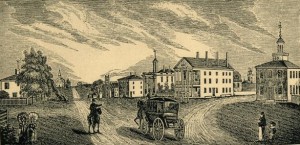
61 Bowdoin Street, Boston, Wednesday, 10 May 1865: Poor Lottie Hemingway [sic] was buried at noon yesterday. [It] was a pouring rain, and I suppose no one dared to go to the house – the disease is so fearfully malignant. If sympathy could comfort, her poor mother might be consoled, for all our hearts ache for her. And she must be so anxious for the other children. It seems Lottie did not sicken till Wednesday and [her sister] Amy[2] slept with her as usual till that time – spotted fever with violent spinal inflammation.
Our precious daughter[3] comes home tomorrow from her week’s visit to Annie Dixwell.[4] We shall be glad to get her back – she leaves an awful blank in her absence. Continue reading ‘No sin in being tempted’


